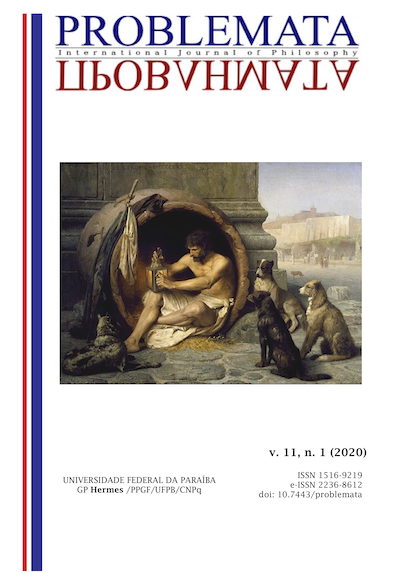CAN EVOLUTIONARY DISCOURSE IN THE BOOK ORIGIN OF SPECIES BE CONSIDERED A NATURAL TELEOLOGY?
DOI:
https://doi.org/10.7443/problemata.v11i1.50243Keywords:
Teleology, Evolutionism, DarwinAbstract
In this article, we will use as theoretical basis the theory of evolution developed in the sixth edition of Charles Darwin's Origin of Species, we will analyze the causal relationship developed by the author in the structuring of the argument of natural selection. Darwin's argumentative strategies. As a methodology of this work, we will examine the chapters that contain the main framework for structuring the hypothesis of natural selection, based on this, the causal elements will be highlighted, as well as the possible traces of a teleological discourse by Darwin. From the analysis that was performed it is possible to state that Darwin's discourse has teleological assumptions regarding the process that leads to the production of new organic forms is clearly shown in the notion of changes that are produced as adaptations. Natural selection, which determines the preservation / extinction in nature, has the function of directing the evolutionary process, so that new improved forms emerge. From this, a teleological principle can be assumed in Darwinian argumentative strategy, for its ultimate cause is the emergence of a new, improved form.
Downloads
References
DARWIN, Charles. The Origin of Species by Means Of Natural Selection, or the
Preservation of Favored Races in the Struggle for Life. 6 ed. London: John Murray, 1872.
DARWIN, Charles. The variation of animals and plants under domestication. London: John Murray, 1868. 2 vols.
KANT, I., Critique of the Power of Judgment, Edited by Paul Guyer, translated by Paul Guyer and Eric Mathews, Cambridge and New York: Cambridge University Press, 2000. The Cambridge Edition of the Works of Immanuel Kant.
HUNEMAN, Philippe (2007). Understanding Purpose. University of Rochester Press. pp. 1–37.
MARTINS R. A., MARTINS, L. A. C.P., SILVA, C. C., FERREIRA, J. M. H.(eds.). Filosofia e história da ciência no Cone Sul: 3º Encontro. Campinas: AFHIC, 2004.
OLIVA, A. 1990a. A hegemonia da concepção empirista de ciência a partir do Novum Organon de F. Bacon./n: OLIVA, A. org. Epistemologia: a cientificidade em questão. Campinas, Papirus. p. 11 -33.
REGNER, A. C. K. O conceito da natureza em “A origem das espécies”. p. 35-40, in: VI Seminário Nacional de História da ciência e da tecnologia. Anais. Rio de Janeiro: Sociedade Brasileira de História da ciência, 1997.
REGNER, A. C. K. A teoria darwiniana da seleção natural sem a leitura de Malthus. p. 47 -63, in
VILLA, M. M. (coord.). Dicionário de Pensamento Contemporâneo. São Paulo: Ed. Paulus,
Downloads
Published
Issue
Section
License
Authors who publish with this journal agree to the following terms:
- Authors retain copyright and grant the journal right of first publication with the work simultaneously licensed under a Creative Commons Attribution License that allows others to share the work with an acknowledgement of the work's authorship and initial publication in this journal.
- Authors are able to enter into separate, additional contractual arrangements for the non-exclusive distribution of the journal's published version of the work (e.g., post it to an institutional repository or publish it in a book), with an acknowledgement of its initial publication in this journal.
-
- Authors are permitted and encouraged to post their work online (e.g., in institutional repositories or on their website) prior to and during the submission process, as it can lead to productive exchanges, as well as earlier and greater citation of published work (See The Effect of Open Access).





